Retail group Neiman Marcus is Luxury Daily’s 2019 Retailer of the Year for its embrace of emerging categories, a new market and the circular economy.
Neiman Marcus and runners’-up Selfridges and Bloomingdale’s have all responded to the growing consumer demand for secondhand or rented fashion, choosing to own the experience rather than leaving alternative ownership to their competitors. Aside from its openness to new forms of retail, Neiman Marcus Group stood out in 2019 for its adoption of trending categories, such as clean and CBD beauty.
The Luxury Retailer of the Year award was decided based on retailers' use of impeccable strategy, tactics, creative, executive and results. All candidates selected by the Luxury Daily editorial team had to have appeared in Luxury Daily coverage this year. Judging was based purely on merit.
Manhattan move
Neiman Marcus Group’s boldest move this year was the opening of its first Neiman Marcus store in New York, as it entered the competitive retail market. Located within Manhattan’s Hudson Yards, the three-level, 190,000-square-foot store features shopping alongside experiences.
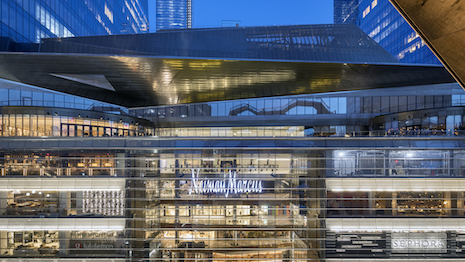
Exterior of The Shops & Restaurants at Hudson Yards. Image courtesy of Related Companies
For instance, consumers can dine at multiple in-store eateries or get beauty services at a salon powered by Hudson Blvd Group (see story).
The Blvd partnership, inked in January, is extending beyond the New York store to other locations, giving shoppers another reason to visit Neiman Marcus at bricks-and-mortar stores for blowouts, manicures or eyelash extensions (see story).
In another beauty move, Neiman Marcus continued its mission to advance in the beauty space, as it adopted a new ahead-of-the-crowd assortment likely to surprise beauty fans.
Neiman Marcus will now be stocking its beauty shelves with high-end CBD products, also known as Cannabis beauty products, hitting an emerging trend early on. The new offering is part of the department store’s Trending Beauty initiative, in the hopes of tapping into the potential of more unknown brands and products (see story).
Later in the year, Neiman Marcus courted ingredient-conscious consumers with the launch of a clean beauty selection.
Available online, the selection ranges from hair products and skincare to cosmetics. Clean beauty has been a growing movement in the fragrance and personal care category, as wellness and eco-friendliness become driving forces of purchase decisions (see story).
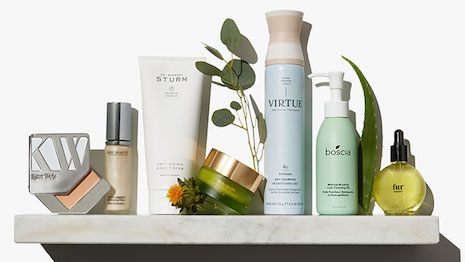
Neiman Marcus has launched a clean beauty section. Image credit: Neiman Marcus
Aside from engaging consumers through growing categories, the group also took on the booming secondhand market.
Neiman Marcus Group furthered its interest in luxury resale with an investment in designer handbag and accessory consigner Fashionphile, following previous partnerships with other upscale secondhand platforms.
In light of the rapid growth of the high-end consignment market, Neiman Marcus has previously sought strategic relationships with resale retailers. However, its minority stake in Fashionphile marks the retailer’s first investment in a secondhand luxury company.
As part of the investment, the company is giving the pre-owned platform physical placement in some of its Neiman Marcus stores.
Customers will be able to get an instant quote for their previously loved goods, and if they wish they can trade in their bags or accessories for a payment. While Neiman Marcus will not be selling pre-owned goods through its channels, the quote service will enable shoppers to get money back and shop for new items from the retailer (see story).
In another secondhand move, Neiman Marcus Group's department store Bergdorf Goodman teamed with GOAT to bring coveted secondhand sneakers to its clientele. GOAT staged an installation at the retailer’s Goodman’s men’s store from Aug. 21 through New York Fashion Week (see story).
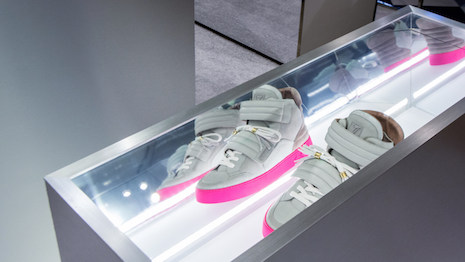
GOAT's display at Bergdorf Goodman. Image courtesy of GOAT
First runner’s up: Selfridges
Similarly to Neiman Marcus, Selfridges showed its support for circular fashion through in-store shops from resale platforms Depop and Vestiaire Collective.
The Depop Space pop-up showcased sellers who promote a more circular or eco-friendly take on fashion. Recreating the experience of flipping through the digital selections, the space includes a moving clothing rack (see story).
Resale platform Vestiaire Collective opened its first permanent boutique at Selfridges’ flagship store on Oxford Street in London, planting a post for the fast-developing circular economy in fashion.
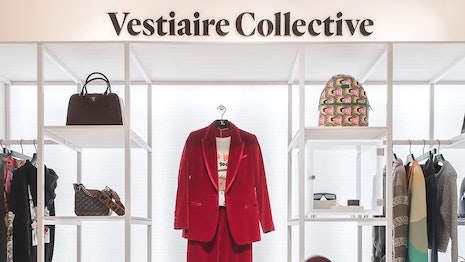
Old is new: The Vestiaire Collective shop in Selfridges' Oxford Street store has an edited assortment of vintage, secondhand fashion finds. Image credit: Vestiaire Collective
The move, coming after a two-week pop-up experience last year with clothes drop-off within the same Selfridges store, was 10 years to the date of Vestiaire’s founding as a source for consumers to buy and sell pre-owned apparel and accessories (see story).
Selfridges also extended its in-store experience beyond shopping.
Taking the idea of retail theater to a literal extent, Selfridges became the first department store in the world to open a permanent cinema on its premises in a move that seeks to increase the experiential involvement of its brand with shoppers.
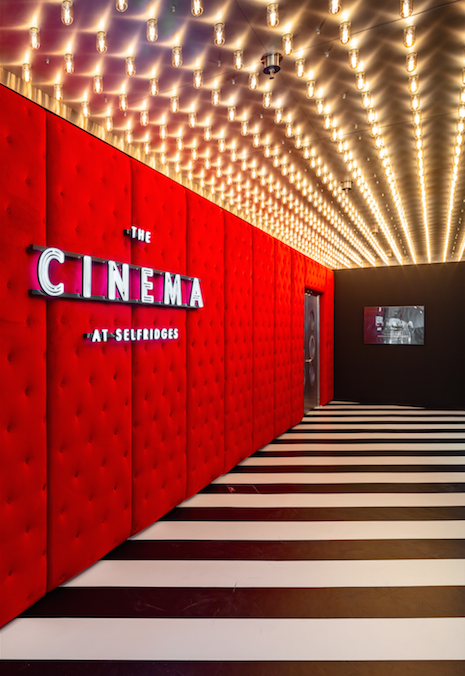
Foyer of the Cinema at Selfridges on London's Oxford Street. Image courtesy of Selfridges. Photo and copyright: Matt Writtle
The cinema at Selfridges’ flagship Oxford Street store will have three screens with the latest sound and vision technology to match movie theaters elsewhere (see story).
Second runner’s-up: Bloomingdale’s
Bloomingdale’s is also adapting to changing purchasing paths and consumer demand for more sustainable fashion options. However, instead of secondhand, the retailer has decided to launch its own branded rental platform, becoming the first luxury retailer to enter the increasingly competitive space.
Although other high-end retailers have linked up with subscription services or partnered with secondhand resellers, this marks the first time a traditional bricks-and-mortar brand is merging the two. Interest in subscription services and secondhand apparel is on the rise, particularly among millennials who look to balance convenience with sustainability.
Subscribers to “My List at Bloomingdale’s” are charged a monthly fee of $149, and they can rent up to four pieces at a time. Shoppers can also purchase any items they receive, and there is no limit to how long or how frequently they can hold on to a batch of clothes (see story).
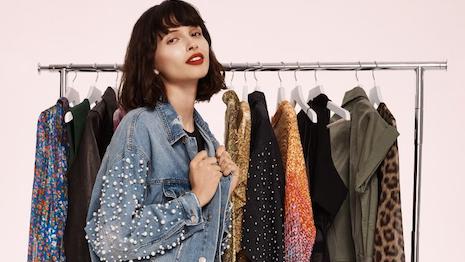
Bloomingdale's recently launched its own subscription service. Image credit: Bloomingdale's
This year also saw Bloomingdale’s make significant overhauls to its 59th Street flagship store.
A refreshed beauty department has spa rooms, a fragrance hall, interactive displays and other services meant to entice in-store shoppers. A number of brands have technology-infused experiences, such as high-tech mirrors at Tom Ford and virtual lipstick try-ons from Estée Lauder (see story).
The retailer also revamped its second, third and fourth floor ready-to-wear departments. Mixed in with fashion are makeup counters, including Bloomingdale’s millennial-friendly Glowhaus concept.
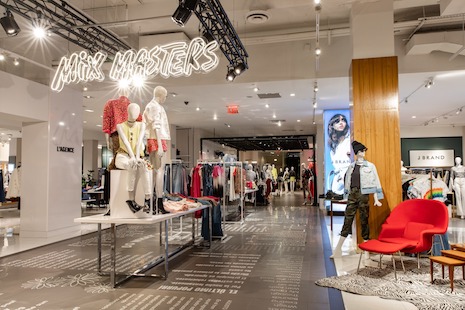
Updated ready-to-wear floor at Bloomingdale's. Image courtesy of Bloomingdale's
In April, Bloomingdale’s opened The Bar at Studio 59, which combines a cocktail lounge and content creation studio, allowing visitors to get an inside look at photo shoots and more (see story).
{"ct":"+4d2oIJQPyTUH5Nx2aYnowidh9ZdD3udinGGUEdJMBS\/mav7\/W8N0QG8tZXg1NHMmNB6RYr49vHBsvdL0kZ8+pT9Rp8E8xPE5oEylyc6AqD9ofavEZgb4O0PGnOFooI3Yq6ZAhqHxSu2ZwT+1MNkMUKZIKWlkCEBLFbfmXMdT2so0sbShjIVth9l4\/U2xSGfddxY\/uLXf7\/DSJeWpQLWPBSygdripuN+Km+4Xe\/PixixXTK6qYHMUDF4mlCz2dq+8Vt5s3pLYTR3vynkVlkdeXGzE9FBYs8a+zzVfJIy2kNH3FGVww47pjDT3Y3p7Y9Lg5n\/G2hMUQ0+lb8tTJdcSUlvfU\/I1BtOJJHQU0oQiBA6NmaMwH5Am5f3GpoiuVtDwkdhvvCJYnZO4zWGojF1CuYOlexVk9YZbzfs+8VTNB+rlkvrPgHhiOID+U0RbibFNXPuuNIShabyyDjjhzQtWIN3EquWCs+8tbKYIfL73zBLbLsTe7\/BHtiGk3SS0Of7aKJtzZpkcA+hDoCKByWQ6oCKg\/JwPg+e395PZAtK3agnxzNvO0CMcH7tTxQQd72N+ez32W1ojI8xLLwKb2Kxm6faVGoteasrz40Wz6urAjUqyBDtbunE55loZbRct4t+s1GGeNiJqV\/w9PdZpmX71TTLUR3mqdc6Q+l45hBA96ksRPT9\/X64j\/GtHJ+GAwJKa49D8Sf2CvmG88YUbQD82wztYd8OcJXkua4XI3v\/0FdH2AAN4p\/2BjmwWdblYYVTvkIp\/4iF2qgeexNYb2+1aGOWdGe+aJB6Pv+78Cr2DwVJ3sE5u\/ChyiIhbnlJsdNAO31S7UZt\/z9yRtJnIci6kNbz96WRkzbJ+oLzWw\/TI8LjxeznkA6WTPK9dHxdaB7+yzgMM6WHr9x\/0Jeh8IvkL9HvWUG\/UznTfTbbnMbp4K6DmgNuCZTw342AXTrpwgfzL\/Jtwp46CReAWlzTZ5YIruEDkABay40Wv1lsqZEQFcd6V7Hq487dU9+a8fK75IKfbbKIJH7oEEwOztsAX9VWiB+f++whYHUtqVongK\/MWzOQg0Z4teqh4plQHSPpMmMhnwVOo6\/et5mbyYHPkojEqfvChOheu3gsPsCCsuDPv6o4IGhsjr4hWKvxU5bv98AL1T8CFVNekgxNJn0DDETiRhkA6Sn\/QYrt7+24aIvAN7ATGeYuFW2qqe+ZLGdh70YshW31Kw0A0JbenmY1x8Nr\/CiMsmBHAaEE1p7\/3iKkyrc7dIlsTywqDpHUcHEEIFoLzrAvGDyX7yr8\/4Jnf\/ieV8A+20cYBzvhCzCW3Wf5Lcd6C2gx5vXkPQVzmVZkselQiQwrqt6Y8tIPzXTdvgYcs03qHMxl5f5EZutsGh1GWSDeluGUsKu97YRZwaoRV0wNIl5a7shrErJtYQefFU+u7bkKczfN1BVqT7ZqwjpGrjlnef9+3gVP4qJhqHAA4vysq4Vlmx7DZzUrZ2Pkui0wdSsGnG\/3bQ9gltOMPfU8Nv5HMkbXd9FJvAMAoRJx89b3cEjG5Ji\/c310YsXyzpdtLU\/BD\/OM968VCJteHqG7qFq+RZkOqX6FmM5t1ddWGuwnZSeA\/8wYucLm1vDHWTqVackSdWF4X9WsSl1o9eTeO6g1wDmNKTE8O9E2fd7ud1jpwA3hYM6RXcV9WtOJ\/J4xyL8Ku6zmjXWmIbPPqZCJEwrvHGI9b9+so7BhkgBqQis+tS88j8VL\/XGY23sCUWJIbjaJtCioXW5omQOZu99CWSzAfMi\/IMUqDuTGULrx2UODp8GLSwM2zcim57awohgRBHxwZLnWknq6c+5mvBesgZ7JGaQwRJfhG3CUjccQGI+sQX5jSlbrU0UbdsymAnzYri+eS2qVl1lc9AfKHVE8bF7jTprv4zYNxB7TCmNFpea4VxIWAQTPjQ3u1FOkxTAsW2KS3UBBNTTRv7mEAKzDUFNnCLrZi6XMgJRiiOjzWe+KVyUg75rHNYyhR0K5BwyIaZt3xraS2TAwFm+0pNXL7J7Y3KAQVZqaUbIEpxpcc2hHvA4h2dIB8RX1yMgLDJU1Cnx38iB2rhagXp50LGKVN0GLuVuLno3+jaNOlS3ZKkRgpMZXwTVLTnrrKejFGNwbXyXo9B8oP\/hB49fDj2wx1xKdcVzUNwxNI39cbFz\/VSYUz17\/rhUOGNqhE3V8yoUuuyK1Asc6yOjJHZvUAh6gDwAaIaby4R9TVZmUqnWw3inQ8enI5te1M1TfKdIfVB78IePmN7hQU4EClkzx18itsHx6Y1M+WoPuIDLeUpGF8flHAwZELU4MOtXoCpDY3ubwTp2g\/rpZztQEYrsc1pdUj35EV1NhOnqqhn2Ita4Nkczu9a1uddbvbmotR3t1NcctlJVeQhPllpGJlLTXfoHVAAK+\/fj6bBl5xqCREOLKzaIlzMBAdIYK3L7\/p2ReYktKYeoPA1qC7q9D4eE1pGFnomOL0p\/DNK+jEh\/nY3NBoLUWfld7itGSllvCyTTasQigeJotjkq6\/OfzjdAqkandcc+x\/0fieBFVOoGOMe\/pyU1qb4AVQDP7LN+x027Bfw34EfUrPoDStIXBt0681KsFLZ+TokFD5vBQlbEOqI1xZ+osVBNoJFbpWzNzYzVyUJWXsvI1KsdPN2F+pVKstjCa6\/hg9gvNBYBBRSOkyHJXAz8SWneBWa15\/eLtEKTfdNVK5vPoWJ4QfQEU+08n\/PMglUUcDPKsVBrJiMHSXbRo1nb5eA5Sv0YJKTjJzW+HM39\/\/YTyXgL9zdz2FJcgXifO+oZaeZhiXX05JigbBXRrjFXKq73L5k7AeAK8Wi1S1CvX3UnZ15RjJninS3SzrXY\/0Ulzw\/mQBRpMzmEcorbjjembSNWsr43O9L5tCVJxf+HlyMiF4yZP7GcJNiI\/ZwJqMhsykXtaq20l25XXgoS+rDmSbaAMZYUEjM7rHjqAKg2bVCBTEaXQEVjaC+2UFjoa+TPhM43DIKuptYg2cJ7iZgpXzdMYsFu9AC52jTX\/Pcw5d16Dy\/Tt78NtO8YxpCtCLuOyQ\/BLOr7Zq1s\/rTgQYU5w\/F3nUxlyYNECGhVvtvUNO9v34sU5Dk6\/bH9cDCIgct1NBUlrGxW5+qNF0T\/2vKmoxNZgvMqUt18ul5Y1cR5JYDHpQX0Yxsz9+fRGAnB\/YD8KOSac\/p3eku8YwgCnEO3mELnk905cc0uEVszJmJBh\/Hh3EljEdFeoBk86aScnjaLwQF6RG\/oQg3jAXjgDFNFAxZDvm0RlyrD\/4gQHPCkjq82xMK\/gtaLHAq3awGg59h59EJO6NEoV30uapgVbMQLnz+akqtLt2AJQDCB9cvLTqMtGXadYpuZmQh4WUr\/\/93HrT4V\/3qKDA3hlCeqOtLSbJIBCDEDF1mdzWrzNZ4D9t5olHqbwNs9hdDm768\/G3qbBUS+TdiQ\/CRnVcJa7aps8KcxgbZqgePAG4V\/dGl\/+r3EbBUCWfT0l7CeHDz0ua72sLn02fuXz2QFeBBUIDN9zaY+3hoI\/0intvP9\/YNK2bwt6zlmSDLtsDEqZaZRmzzQUBgoRKvekuzUf\/ipshjp\/dY7OcacHvAK1U1WenvdYCn54ZUYaV7myIImA6NfRt2fbQrzMQT3H8ZmO3h+x6V08RGDLtOgzahUe8rhSOTndJTx6+qyely0DiuNbQitE+Q2IYbBsxpXVUD8w9PlxGbFwRNBOPB6m\/Z5ohl6VCL5+kApYvuV\/VbQ83tGLov9f7IhlbRnGlkkRvJLZ8fh1n3Z7KHpbA0MVgaeTf0EJA8seXnZ2x0C0IuCRmybgWQkhz8wqhY4rQ\/vP9xDl9ZY9lqm8OKHTYsE6Evp+1M81dvSg0Xu8sMPCyJUIXKfoKgUrM5XCpnotR\/khdLuCln5HF7QzqwUCLfRlP+RQwpCx2cjDCnvy+z+6aZefitZpRIEfImCVb8Kx7oE+QywJ4\/35qsQ6StziECIbRoRmZzcItWlVb22\/OpXITQVZtOmbQ+Zz+P\/6bCuoqAayCI2oFBJwVJDhKUWK33NkLjpnzIjNuZv18Z95bHcU+KnM2xec61hPgtjXTTv+rdHFr5SveqtMIU8SEcCy6\/omDxdb69e4bzfx4X4ZitZ6CgGbhBFESAZsz9DzHsePg\/xClmg8x4xgygN05lD6CZ5fagP1MFjrnMAgXmZHUB2lZSHxpcGc7tDESZuGLQd9NNmY4GT2xtb5iLEahM7b+zbCIn7OOmfekmk8ShB7OouLuIdqQZNelrAm40r53kpPJk3Q+ore0frvdn3StrGy9jsUO0z\/daHfuZECei2XZhJXkrH3P1eW4irghqD2iIsvUyx5a+X6yrQ0QfvfcUGi1NPg984qQXiYhRCXGQx3c73LiMHao1EtdBkynnW59M0aytcHJ3Q\/lC5hIfOaIM1CQMooyozTlybkXAuv7SPB7ZtonlKe2YJuJi7K4dLHEzYrT2MRilsT5\/nulIPZwE8qVCT1aw1rg63xTsnLRrgA25owM+j3xacmyJQaTpI\/q9KJ7YClnWtBS7t1Vh98ZIvQ7xhQZtZoDcdE8DXtQoOJkiRAlaa0fyYyOTElEnAkjVtT1V0fmuyWKP5BHSeUbnEIU8hS0d3cZLcgFbBHQvb69w8GBM5XK0S3W+vGp95DW8TLPyt9CQR1xNAPkQuu7PisZpxIRzGQOMMOqSt3wx2ueZ3wfuFUPi3oajBEsNSFwj4OU6b8QVa2wOvNjPaepgBTh++nOJY7\/21NXZg3LCROuFYRW2gEWfiDkCXmIpja2qSVbwaBi0hMRo3cEargHavOXkA0d+XFdFy5zK2iXKPyl6Z7BS1FKLb0Ama7wT8K58Cd5Y291QeH2Tj2cQv+vfwriiLj75NMCwfckEwluU85318+jSEQzgFUAvRH0tqf\/B54B4pcfHH72HYC2UGVIGLo5hF6Qkl3oaus1e8PxzLLr1Om3DUQ+y1DbJYGr2mm7hq1QXGn6O5BlZreriN+HOF+QyAka1ZCX5bPtMlfY7uMd+FeBmZS4+YJ42GsZJUqW5Kg4UXVubfPy3RaFkFhPSuLD0PIrjPMljinUUeOI7WY4dmD0JOlBYvHBekkO+38aaIrumOQMZ1KdN6d\/QX8tRqzKlpMlTlH0O7shYqwV1Tn2QQnLQkam2Uwnnhs0viI+ZIFq4P9MpW4Y+5As0SqzY4NVh1g6l61PF0MdXBsKMNO1pl3GsaRvcT8XaBwsLXgGVTQfOurD0cBG5FShej191MWgNuSWIsaC4CILaiVKogAY7PuFzO4POskaJtGOR5arrdsVCo+tCqwaVgPBIs2u\/dfpIOTucYzKVOGvPeDIIewvJ3hmuyvu48k7qSCVjt0q8r7nj5nmkhMeUrbb5eNHkNcsXkOzVdIOPkC+r9yGl8Qi6vSQLlLomhPab\/gBT1iuJGN7NlP352pn7Gz3OqRFnklNDvowDkBSvF\/QdDW+h+oK9VgK5BNmNqgV43altGBhA6EzuBsv81D8Shvn9v1rNcOVBYJzXL5qhrLTJLUkwkKteiHPDlbdNO\/6T8mPEW6VvGrXEZCf\/6kEnhGRqkP\/IH1Hd89L6VSluqsmAlY4m+VaxW0LQZqLJXrfFV3PASIWVRhb0FrJj2y2yRmjvVP6iKtqEow6Q916YCSq6r4TAxQUxmmqvsxkbYml0c4whOiaQ6R8rs8aVxhNsX7VQA5h6Y7wCxoLmyY9ZzfjPcs6bI9rDfb7p2s00B751lvduLpPW6G9jffZSiEExINJT8V+ci\/0mAmSdIi97Gj1Z38zEPv99Y\/424oug9wyZ2eQ7ZVUI0DgN8oDTZLTGT75RQbsMZQpuu7A7+Av5s0vZu3WfaNpVAvsDCz+9hVH7mOK4kqQ7hhSL0aH1GL6djk3tRxcHkKCAuMx6dTQPhKwVL6jOHk82fOLwYr1gIWKF0UKHGnGvcQP8jOzJNskAgFTCtXYUf+RSA22YrUlbdha8pMrhvhuSkNt+k9\/ok002j5i3\/7ctvOU0P+\/MZCgT1I2tv\/fCMsMe44UG6d+\/47ArvuQm9sgCKFXVP4eBwtdph3WIRL8X2W8ddBqkCQG6S4W1ka\/TbUMtxCXj0sVeJ6YE6TTySZlmsBtZgS57OUA\/E0wMscuvX3o3K1tqWH8DTJPvrRlH6DXrn8fhXrWllrH+Q5TS3il0AnpY1G3zdk1lG789cy6YYOOx+khOywbBwspoZ8SPTOFoSuy87Z1AhJaYQF\/s3CH2vklJRaNpnNd+ysagI6S3Bxl8NMtst7RWZY2cWycphsk1zQBpRIlwv6fRZoSTy3MxZbfx8wSH6lbs96vxkXV62aoC5iLnCumUUXtUfmFgt5rLm8iztOnyKr35BVCfh8nx6xk6THk8Jx8f6i6FatlnNVSwPS+USVETWj\/kn8dTgM+6bmZ\/L14+Qy74pDf1uZLJdTJ3YjzVMfUPT3+DBd\/NnIypbWLoQRZkXbTb8e3K2K1BtV9IS4\/x5Rf1ld81vfyc6uSY+mOj\/DCf9mdiGWt2TpgTUyMPZjpNou8kPl9F+SaNCh9krs+adUtbP9hnChKohu1myrkd9gVQzlguqSHoR62NkMo+KlVPOMXoaH0Ef6avgLE9bz5B1n0hzTRIzWiekCiBZDvl4NbjvkEfPpaF3F7DclHmSlEiWOMOmoMBqE1mHX86mwRa4MpB3T\/QjAnqBnzPasjtEsoSw5V1Xs38+s5U1uFFzlfDxgS3nw9UugBVwY\/3dn8xosgXWbnRuOYHqopCCyQL3b8mLSE93KQvUIJsYQsEIuKPSaMUgB5J66K7CX1EQaSJDRCeqGvywHvfjH34zBcweLyJh3rmQHcb4BxZQPYSYl2+2EwOZ85ys8WsWtjcatU8OSJcc5Jjb8gIMNBOHlwoYt6XIPICLeLZ2IZgSY8kUZCTOMXZBJNKF59Q6m9PwZ41zJHiJlbr804a7VzSeSEWk\/ptYT250dnT3jPbpNffv\/lXTOzMIQ\/16fral7WhVeT5q77b+Xift0ltACn53HO26pdBkQYjPBrCmX7CLQwM0WnDSP8h5JzRs0IDsbNf6DZ+ZeYHrEkBZ22BiuQqbm3TfpQRZin7th1ULMOsMC\/37qp8TRIl0CL9Xx44MCBtyeJgq2jSEr5cOayDJwcw6dOGreWAml6u9tEyEgTSjjYO5VxxJcXsVTdMaf1C\/ScGwmm4wO8L9n1mg28rIzpd5h6elnq+XJnYyGOIVp0iys2Vgq79oc73dhZu2nU8KV+DAVq0CfYpESbVmLMTx750Jn4xMlqJqjiAf1EbDJSjU3xW9Q1G75rkCpysh3y7zZlEjV7KUiP4LZUy+MFg2QI4sH3O+oRP\/zBtjC5qme4Of8Eh7JgOjRIr6irK47XyjVxKT9HcNgA\/RREjOOqbgqgWg0PRMYwKOYhZ+EFRfC4JkYAf5cIbwkr9PycwY0xGa2FDWlbTO+dfNpmpiZ99ZbLRGLn13bmMRLAh6+L1HNSac1+R1AEQzlIRYe6urEweTx7T3l02Sz2JRmKCfkdJjfqxbX4XQCqNWld1oFZFT9exqzXeR31daqH1GIJA6Jsbqz32EqCybKuIS3FCdajW2fHArxMUSSMYRIPtpOPW+qget+YkA4Jmhyvudlo1F1CAcKutTJezUqVF7jTseSxbzoJlcOxMhQVP5FszikPlAERE2Hx7JOcYhGCBOpJCITqBKjroNN\/8n7\/kzAlVTZUcdF\/ibniJx6wWMrgurA+weTgRwYwKNT430W8hNe3qayBXhsJWuzMT+gD9Ixl6D4uUrKoO\/4TxYcTl7dutxoM\/3gXR7XvxV+o33p60Ylpe3QuG\/vUqKKZL291+7rahfreBPfOukRgmwS6JaHMJRBEYeve3c65t4Ru7dtHGQJkYCRvMLc8uCC05zaHTUrjYISnEneLo7xgmoDD2EqfVSK6+faOWG6hsM4WWpt0zidXEG52DaAK+NMnvjLJsXRGeEFOiiiTYDqod5kGVXmpg9WHIR3ioJRVFpe43pvWqD+Ord0D8rGNbbDduJ\/dbeUKCzfusGZPZwoYKLvfCP+4lGEw6GeaEoxj89Nyo9SDgo5uxVXEibIvqrRm0mwwzp1cyJk8DfIFxd7w4P7n63hnDdCmFRG10Zf0GBhhy3\/eWyRhFVguy5ocDAo5PjKWpulTxM\/Z0DTu\/pwBUtzx9PQNQZYsGlJr1iWsiy25yQ3dEMnDXvzjJWmck\/8K1HJDV\/IPUYmS0RTZtAJwQeBy9kwEBN07WOEMN+Gr77PZ2D0CYmxBNBbGf2mtiwlvWzuuntL0M2J3pk+B5wuEYW0xUYQaq+R86RjIHph8RdgQLcnHEsp5X+FedQWGhep4xNAVkYJ9txrdDebD3LfZ7x5GfsKkE1IERWR+XHAqXCzADffawDvdW8Qrd3K2a15PwIBpv5UtjI8mV\/VsXLHGo35yy6jnChieIV3QVXs119UWQG0kSC5FsFbQ4gNklVSxDNm1kh12\/csdt5jFBLJ929YLmcs1WF6wNL6EPboNJJNBIJNOIaKdJsY31YarE63hm6ztxQ3MjD05rp3K\/wrSFM7wUTUd9NMe6kFEMEhGMQtF+bgmkwCpOFwA5JOutA5X743hbUQMO2HRJI+F6lM0A1KuhxkhML6\/SI8yjRRlKp0TjhWuYuwm4Kx\/xupTkIUJe37N8aK3PYxt2804G3SUCBw9\/s4CzKfP4wxWTgJB4VEOdtLJDaHmDTaJZuFXK3Tj\/iu+EqJmFD2CFwHu7jNu0Z0rqkngAEasdaaseGPum+B+mY0++2ap5Ko\/+pOH4RrGwyO+cAdoTpohjXoYq73IdsXhXc6gGoSeqcAkhMJHRwI8ecvoc6ksxkWpSsW9hx5s9E6siV01zQkk2Je6B+jgJzJgRv\/F+JdsgU7Q+kSnAJ\/n4abiF6u\/31YAmFzCcblAwJTfmwIyvZ84TLIVCPxKnM8iqdEXc8O41ls2L\/eGz1d6Leeeqb9eQz8HKIfb+Zfe8qGw3xRazHwetTSz8Ixg0wQRq34MnLuOi8l+Yo2KRUQikZA5Y\/fLINAskmfsvZFc7ewU5YDpi61ZyK8E2T5Nmz1bfoMQJV\/X1E6fxa4+u6pf\/CulGtT5IMgRmQg4PZAE9dEexXrdbg3ExGua55mfX0Q6wEGGHTmyVyk8LmmiYx\/oaSWRJ4KWBjGeLviKIDJHT8tKZPmfdeOcqByvpdGtQZGGqF25MaoTol01NgzlL6tX8j0vveZ6w3pUD8k3ZhEzcRNnWi5d5yyhhtuj+IMmD2pN+OwKsxxUpz2RF\/D1OxpXfHGwiq4HltCgKKzgRb8C+2+esdMfuuYi+LcyCXwhabWUacg6uHDNjh3cf6nl\/WAqk3WMU3qVot7nLun92A02hrChYFtMq6r5mFCZu24edSKS5+j9POUNzGmTifFwJP+mAxP2XrGTgYAu4zwxZMaO8NQK5fpbCzCX+kj84EawACYEB1gSBVzbGduHBossYhkOxvMkdX3b3BzyfZ+Cjcg3hUGlD5bz3XjPv\/DLchJrGzsDv3C08mbtuaROk3oAH+woWnr69fCOmvYzyqVFvvySZvY4JCvURXHI\/0CM9kgPx6J+Y17odL7p7LvfL7lgK9lIsNKMvoT+uz5cISAMxEwa3Yxhi7U4uwSRylK06WLhDIhNAnA1+kjPEd1TNzmJbHuGBRytAjQ362QS3lc0Ck6noPAQQpTrhKZaKqfCjSQooTAOFveexJrUaCHkFQgAbcqZhLF6nBVD\/nvORgx+RP6+cJIG\/VHnxUhxKYwIk6MgZkwFzu8WYaBm48rflQZbkAy+xY7qQ8Jvtm2g0goAFHVnNNYICpcjLEnsfRx05SlZ56Qc4yNHZNbLsC1QLmYuE\/hinIU95oSsTtNv3ksaFdH\/rmkcZsMyvnif88yL6s\/t0RH56IrzGalpM\/p6Tr8eFd8I+xTNsWOU8Z6KaUevy\/cBYCgRDoKBGEYFEC5xNseCMSfXyZPQeFh8iJyePtTnyl\/f0u6Lu\/TvheJCNl0Yss3pGAVgaQhHuZ3Vmri86oyIZvT+LhNQtSGUID8SG19rhkxgMsiPCmyDKnYVpLXBXi9Be48XQyjkhJUHuMc0u+xEdjqJr2w0vX8k21U+8LG\/et6tkDJudX78hm+p5+QtgRMib4RmsOTscoQ6RGCeo2yF0rlVc8Q8ESib5Vh+jOnF59mLfj6O\/gUMJKDqOAAunn+J\/mtvQMNk\/r0mA+ZmypjEXaL7N3hUls8Mi4Ti1+Ee8t0TDaP15oE2Z1VXI5Ag1CMURbpRXlINVlzNZKCsMoY4GQRU8gzwE3qWKAkWxJ1\/uuxHX3pHS\/9KLgEXosvOGSt0P0sGcQwLiN1s\/uorm75xvnLot17JyLQGdv4LMtPz5RTd72oy\/++X\/fAA4yvJ78C3eIa2rTEnhCShkUOiu93xFtZezyutYMuY\/LYLwsr9wNN78w1kL4vFc5oQwVWUaiEx3\/LEVaYeoOLmdBNVIqSCioY5f0rs8POwzOg2yWuY0CpCUbSzCH4veIUn7TGv1BcV6F+TJZiudoyQNMdrAQi1pzBhbq1crPCfV2ERU52pEZ4jZTl0I8xnF+oY493RapenYgFbsbAOg2porcLXTWiapiuIqsEHwMoHEe+Cr5+o\/J\/exFisImsGKeJdkO5CtSBIgKg5oD4GMwRfDNpHInonoS0RwZl4wUaPoMjUc42HuJ+xY\/G4AH0IKz3bikxx\/cp3lpNnFPzZKn4tbhiUnoylWYFoMi8rJzgheVJUq3KL1PYrHe+OC5NmY08wgjmo85EcubMaj\/qxHpg4vzuZoxieJ41WJLAl5BMTtz65kVo8zaX1zz38Y\/67zlzK3WryXosVS7A6FVYFkkFN0t3bUWVS2dKBCqHKel6mbfp9bl6eiyOe3DurTfA5o4+Pig8q9T9\/WcR4fXnboaLSrDTAgPROCCma45F8Dkh\/JXzc0kB6xIChYnIeBHc4x\/UHfgWAdDdbSv1cqXtREU6qrdVpZQqes\/vMWkuey9\/PPRf4pa78Yx08g4HEYLpxuv2NNw7fDon+6S3IhxOs91Pq0R\/QwoWAhcW3oUlbwyUtBzpCXCfbjB5QY8fwPjkVyENVOh\/gQelliESMt\/XLZ9f2QxFZQ5\/2HJYFirsV+OygGJhyf52B9kWXLfvVO5423p1gJC1AiQKAng0u\/B5nRVqk74+gv1cy\/D2Y33\/6g8zmr+D66uMFMRH9zwMnfurhdGxyR0YsG1T7LTY\/FszAkCfX4YpMMr29KqpbvR5\/w6KffAP4IHAWQU13VapOKN6HSzcrhHfK4Zo2y9nFK5IblA0ZExEJCYbukOtY0HHpYSXzlV3CMj4jCxSD\/KO1BFCCgnqoC\/SiKvE+971WgdHAzLQ9UsCIz68EP5l+ge2KbhqeACjW\/AAmduDOfKjAL06uPHTzf7A0kgItiuDLX4GgCtqGIcYGKwC8ASfBS2wO1Qd05kZ5UjQGd1bXUukWp2dkmB5JHsFWzoSnS7vJ\/sgyATcK2gRUTvYC43r3DYQj+sSO\/STU+gKTIH5XsLObovxXf0ImeJDsDfkkXgTQK0GuwMrF8ryAoi\/Kdivyg+jB7l\/yTEpdjX2nprzmuUrduC7Bcbz8B0GIYtp4wMH5HXej2h7nQOeZNago7Khr0cDx7sZQar9xIRKYM3PyrmV2XtWl3xUCegoyMCS4+BKmM9SqHaecQa58fYSNdvQwD8Mt46xxVo1cFeBX8zMdh3Zya\/o8qo+VkTW8hrYaEZ\/FkkG3phQhmBKUVH5wU580W5RtlRYqUreFbZvIi6JeX7CsebgQjG\/qRx5+l5YO1TPvIFyTHoLaKXQCGhZC7CcnNQ2kg\/DUzgO21H1XPwcxpRA1TUKFzcZHhaON4RXx6O7YwlnPoJybnRJXZ+rmOdJWXvYMZCXfvGYlw9Xju4rgzuGAWqkLsA7+NoUgy+UZYVVtk0lFsUfBFJ8ZYxcVZMI7pvG2mm6FLGUfXIE3JlSHIYxrQhSEmzDFZ1Yu1dRzQnRh+aNPLT3XcvEXZ2UUOwICCYrqRmxzpaP6siz5ZJjlWxay06CxIJnrzn03UX0WCSSjCMivE0Oi4KGblZlKgy+sf0iBz50f5z+NPj2aQhyjmpj7NrbxK2gI7s0pk5URGbjDvZpr9QV6mbahnLq5KRkxs+ecwdn2sHBFRDKLgPX1eSJXNxrpzNHS4xBcAASakNZEUC\/2gSyKeXEFBcrtsw69HfqsHxtI7xLHqKICPGka+CbqpdUESfF43J+KoF\/LcZpttCc52O6kafMdNouo783YbGMPFP5F0JWnXIc7qB+PteB3DCzIRjOAbZfgxAL2FjtIYNROfSf1e7MXhPvJ0yOESio7xWy40uu7HMX7KER0AhUKMNCaN7jeRXMKbeB4tHZpepOXmLZVvFP06wxFHXD1f2GzEr7CU3Ggr7NFFTYv0RRX0cDWiCYwC3N4Fgp2utZBZ88gg\/txuCQY19Ks7fK6ieO+h3IS29kYsD3fI8JYmXNtsM\/dW25mAAGtB1VeV1jl1i7EMMC+jXSSBqD2Lhkomv8bwgL6xR\/x8DSotfQBX179ps9Zdu71jk\/vLPiGENfQHtixck3pYn7WeN2v5H6v8NhjO9+\/EVvXO0WAH8NjmswnWXmXfWMLi7Y5ZiRK88MWus1fz8UsYoR0ufQjibcZPz8reX+zMlBnmPGnKS6XJwxozqVYfqtg+YAhOHu7NkgBk\/Jmx5EaKXQ8XS6y4m\/HZIkltFMkd91KgjyWg00Y1TkWDEL9JsBMUPI8zae7TuNq0bVaE8hKlqQkU2geIC2r0NQbRSNHDyxKCFG53R70BJyUGlaA2VmCxFAFwWZkJDvGfcXiQYq2bHlPXmLVrUwh8+0eEvKotGRvIg+2CzsYXvk3WHHE+xlAd8N8SKNV4z7Gpl3l14LfETPwPGyBluux01HExJRUT4MXIa5gjpCaR0hkqDXEOtaeyU6gQPDW3QGRc3vjslfmMpQmr32aYECAFUJCT01JsldpuW7dBn3OjPpmVdiPZYuSKBzzLhqafYTVsOUltEc0\/KABJDH+W4szs0xkSoUYi2kO5MT5Q8hmZ1qlzhgVw5LLMKCMi0u0jJB0xK9Nf+zsYLK6w8T1E0XtGl+EFEjf4S0NGCOjZTebTI84k6iX0Xy0y0MR0Q1niSceQFS1YoB9U4GfNGG2PbYcD4HyyEA\/fwLATC9vBaNAfOBwvVlNsFN7Z0xxv0fX55PmCSbWooRTDiHwQMc8ZI8mhWCNji3oi3S9BLR3GkMgt\/8\/lm065C5qAOw0XzTCmZfFsHULF\/OTqXCrAWF4NG1QVSHfcMGbrTqo4sdKdTpZfmGNAMJUwslri5hUkdXMn7+MDK6L\/C18BEtueHJjn3CZeInt6w53ptWBAcn9lGUgaWYhXqwF6VemQcdxXHQQaYm\/OpofnoXX1elnvHt4ylX9e4GDMPk\/BBPWg06XpMjjJryHECOyt2lmpvvg1r9z36ydHEqGR5qwifxTFKYJFZ6ZszaLcTOfHVMy9PHDjKYN539KXZhjDOX9\/cnlEXKMrWTlSRZIKtfdPRdgoBmZGE8rrIWmX5OCq470pqsNadlHhgyKInLBMX3MfYYP+0G2RHqGLkJCcLfc1UspbMrFCg9M7BgHqHBJi1zKYm9ZIFG0nmpxN1s6AtGqDtMBgV9xL1FPR4SJtSDClOQy+JrdKPtFGB5lRNqeNy5lZgkLFatX8\/\/Cku1lY4rmkuTY7Y+wRn06eH0GzIO8kV2nrsxEzV2eTirI1i7reAnJ\/idsrH0HpqBOxAebSQmiWt8biMJVabrnKopADEvjdAtRINtwy5wBtvtdWDK\/VmpdQiEM58MeuLXa\/TkbCpGEeVhqnD6wxTs4CJxAQiv33f2DlVwhFSsb9E7R1kPiU4ef+OBApaguEzichOFZsYmwNdN\/1QCuy+AE1xUG4hLmrA87STHVP9B0qD6zb2Ov+BSpkKIiFJ4qENSJKcwh72RMyCQM6KZTaja3XQ3N2WjsPuLzjCbvgj5WfxyuF2MNUEcPdyQ71eWhVC0OfKQPEq4Zp90AEsgETmLsUkgsWoJ1rAPK9ukN3Vhj43Vf1wQFyd8GRLZZMY4vzy+fEDHmh9YfhGFzravJlVkm88WWLwY60YKAPnt8zZpPk1KHBMqVhk8NaQOaEwYahR5Uf6BuNsaoSQHkyS0VQK3u4AhtRmbKl4U11+Aa0iBzbeD774jwCxS7duU5LdfNfoIXhIjf6pjlqsDT+8lJ4ijaTT0cmrExKqAUQBvmTFfXGb0uYTNviQQVRxl7Jiwv68cGsoPBcqfPBSr0hQiLUEJSbJJIlKOiD7QkgYPoB64Erw6ncfgg14pZPYbCF0hA8BJAIn0KUuyahf+staD9T\/Ao\/LM1nS9elYi6QNXHPLMS545SRP4zXyXCRO+WC5+wIjluojO65mAK97amln4KagjGRIN\/eYSYMkGQfi90t5GKnVoDSYMbOgs\/OGObADw3QF\/L8V+TA0BtCD3fH4TUdlWY6tZppR+S41ox0Dbg\/UAs0QF9QBDyAceZnftnEHrdIHRuDuKAlxe26n15UhTeoFlKiN7rmYVeOR\/2LzpH+NJYiuZjO6HFVYugTun9VEn5pMCOk+QGioXyFQN8OD7u90mH1I9Ij5bBzzpWn3ibLmmAFpABn8HNBaFhS9O57cMv6mdSfFrUC\/0XtBU+HK8AU0hs2fRXGfaxwGLPBkB6hQ\/uIFsfGM3X3qtqYU9XTD3TWjW+IVM0ka3RgxeDTitswKmsPrio+zoSsMJSQSSNCOZI9SLjzhNrtTJKfnqCfLmR\/Y7blHBdNToB08jonikQLiJ+pi0u2dwwBM6\/xgeLJWJR1yJkrihEm2IIx1fuRYN1CwuBGAk+HNjf5HCp\/0jxk5CAVontlP404filSAUeLQk8CCnGZ1tG\/4bcg0hCUaLfYtdEExrwM2ZBmNqihzpnXdEyKYHZUH50yV4niXRo6KIVGxpeu4Mv\/yqfJHTnhkMCCMs3qpdQr9yyc86i5uRzFpuVerpbJM6B8D01Mhc13s5SCb8c0nKsAlEmuIeCv+rEYK4tKWZ1HG20hWX0R4piFSIrVoSCrvwLvJ984EC6VF0rWX46KdNtMFwZP15I8q8DaoEJMacoFDpkVxXfziciH7DG4KFEN2bgoFjC+1zMco92+bly+qgDMht2KLp00qRCnopZloptE+NZDpWjF\/bKGUMhqU7AG69V80\/ymmu5CvjOE6G5C+DXpHgUnYCyiZwUMOvsdl1sHRp4VrOWLe7OVJXTTis7VY\/V8KSfjqPETQAflwpAlnDZM2uJ6pMQoMgGkaLCk\/IOqo4bE4oX\/osRbhjVnNzPTZkGw4NyuQv9HcycgwVbLJuFDBenGGUxxipirMz82o1T8N7uRkdvYyEL1zI6Jb9NDEyN+AUSa03QCFuJWOlk7COeLcmqP0wwqM3yByJGeQLvE\/C3Qbu2\/y1AwwH8hiSAcWO6HUAPlEYom32HdQUGdqi15aAkts3\/2OeeauMtDyVRe0Dz+I6EgqosCPnenSYd+t0pp6O4fBAtOx7iMHC1pGd0zGWGLE6WW4FAN5i1Pmr+agcYT3DUFRo6H4B8rLwihN6mGL88GjmmjhP2YWPldggcnGBD1jjoQTMwJYgiFgti5WkoaI1iwQ8Un+7+EIdjUlmkLcgp75aMNxyY\/9reIg5bm1vGj1uCXTzFfUv8tra5btvouiM4oE0tbdqNx7IwtgMplvlcA+AMLPRQ7Vn1Tis10w\/MRIdQwpH86B9pFz7NvrG0vcaL+5o6JluNxSF9CawWGIic+7gpsZoV6BpHf36MsrEEwHqGPou6eaV7CgxP69P\/UXFwZ5iZ9zHuz\/5PoV2Us5ZBxB0xQmCBwJIW66KLoRJn3tGRDOr2Q0S190JEIjLq7SvxhIO6\/pRrr0XBSadgWMfm\/75j7fwaOSSKaWPWHuvJfPfYSpB23\/rgg\/jrtju14kfwjizx8T2aEVIbnYYSiT2r0TAfY9zsIzXo64WvV2uVSIdeWbNFaNJkAmtcremNekuImwmEMBTLdjPaf1GbyBre89rLL4EYdITyFOl1YyZ5EOSVoC\/G9WuZaN77cEpozTyzlzCU9eRE43PKLT\/s3FMqraPj55whTtlS8VTBM32bBsaFivaffMoOvrmrgaViwCBrtWBZcxC1lHiMr50TVobfdPwyDwRJv7ui7CU8pjkp4tzFcgFnM99gpFpgy1IXX7hKTiHfMNdseGQ\/8bgDF+h+8rGqL4LMFFt2OvC1nleJfCduDX\/kSjgDYmRJb4fQWLJz45Z9JY45eEg8KlTF7v1jwRoVEKyPhyN0xp01r5mNrbyfEEKEDOeQlk3ucW1ojNWRwgdELBr2Xn90rtZoE4pgFHQ1AH3KnKn0bGZgJMZEFyyXVHPqFkT3M+e69YeFjM7EF8PxHG+3evN7nxM+tyQXXIsFhnXnexevB93UYyOgmlijK8gLMI8mKClKsmYLu6DyfP0fQeVWAVjcGhmxHxZ6EPj6sbfpNF7VuSZ7vEbcG2v0u4zPNInwqqJi1oKGRWpMrjLcc9dFX091ofOkmuTy5FF0ciYn9Esq1jAAqATArkjElLopCX11mXY\/MZep8FAzkXU63q0XzCSCw==","iv":"22e681d4c3237a9cf209da8328d07d34","s":"0fcb6ea53982c5b8"}
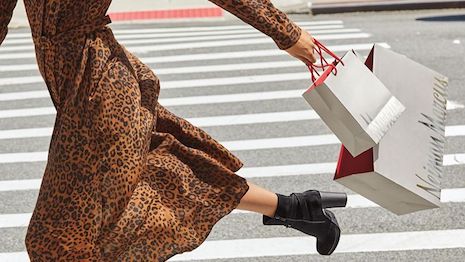
 Neiman Marcus Group pulled ahead of the competition this year. Image credit: Neiman Marcus
Neiman Marcus Group pulled ahead of the competition this year. Image credit: Neiman Marcus